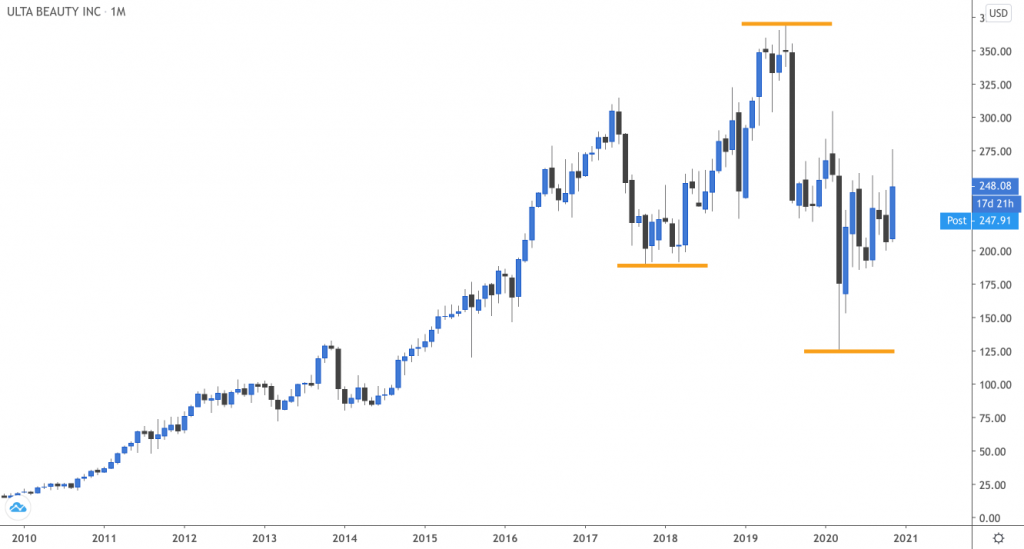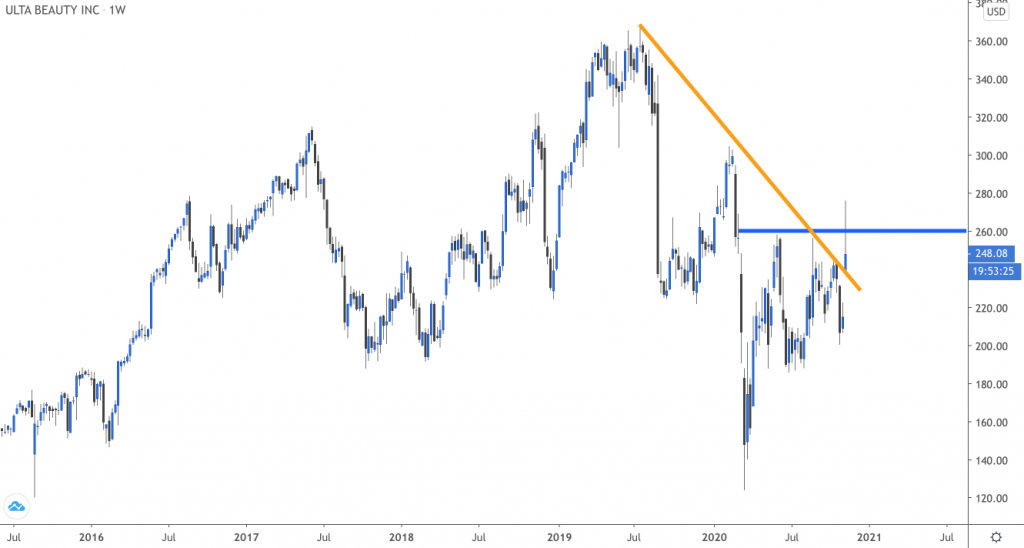As recovery hopes rise, these 3 retail stocks looking like solid bets now. Here’s why.
Pfizer (NYSE: PFE) and BioNTech’s (NASDAQ: BNTX) big COVID-19 vaccine news sent stocks on Monday, with seemingly only the big names in the stay-at-home trade losing steam.
And as the market begins to see the light at the end of the very long coronavirus pandemic tunnel, one group in particular is looking particularly ripe for the picking.
This week, high-end and specialty retailer stocks were on the rise, with names like Capri Holdings (NYSE: CPRI), Levi Strauss (NYSE: LEVI), Guess (NYSE: GES), Coach-owner Tapestry (NYSE: TPR), and Ulta (NASDAQ: ULTA) all moving higher.
Capri—the parent company of Michael Kors, Jimmy Choo, and Versace—and beauty store chain Ulta were the biggest gainers of the group, rising 10% and nearly 16%, respectively, over the last week.
“The one I like in here is Ulta,” said Todd Gordon, founder of TradingAnalysis.com. “I like that partnership with Target (NYSE: TGT).”
This week, Ulta and Target announced a new partnership that will see mini-Ulta makeup and skincare shops inside more than 100 of the big box retailer’s locations across the U.S.
Target CEO Brian Cornell said the partnership with Ulta will “build on momentum we have in the category and investments we’ve been making for years in beauty.”
“This is a very important category,” Cornell added. “We continue to believe it’s going to be a high-growth category.”
Gordon argued that aside from the good exposure Ulta will gain from its partnership with Target, the stock’s chart looks promising as well.
“On the monthly chart, you could argue that there’s sort of a head-and-shoulders [pattern] beginning in 2017 to now,” Gordon said.

“Then as you get smaller, down to the weekly, a confirmed break and a successful hold of about 260 will make that a failed head and shoulders, which is actually a strong continuation pattern,” Gordon said.

What’s more, Gordon argues Ulta shares look good from a fundamental perspective as well.
“Ulta’s currently trading with a 53 PE right now, but only 19 times forward earnings,” Gordon added.
Strategic Wealth Partners CEO Mark Tepper is looking elsewhere in the retail space, and warned that “playing the apparel wars game is tricky” right now.
“It’s really tough to figure out whether people want to dress back up again,” Tepper said. “It looks more like a brick-and-mortar revival trade to me. Will a vaccine cause a mad rush of people to go to the mall? I don’t think so. I mean, foot traffic was dying before COVID. I find it next to impossible to believe that this causes it to slingshot back.”
Tepper, instead, is focused on growing brands that have a solid online presence and strong direct-to-consumer pipelines.
“The only apparel company we currently own is VF Corp (NYSE: VFC),” Tepper said, calling the stock “a relative value play” that trades at a roughly 20% discount to its peers.
VF owns North Face and Timberland, and announced this week that it was acquiring Supreme, a street-wear brand with a cult-like following, in a $2.1 billion deal.
Shares jumped as much as 19% following the news, and analysts are encouraged by the pairing.
Barclays analyst Adrienne Yih wrote in a note that the “acquisition of Supreme is everything that we could have hoped for as an addition to the VFC brand portfolio,” given that it is an early-stage growth brand with a loyal customer base and strong performance metrics.
Susquehanna’s Sam Poser was also bullish on VF’s Supreme acquisition, boosting his price target to $100 on the news.
“Supreme adds a renown, fast-growing streetwear brand” to VF’s portfolio, Poser said. The Susquehanna analyst added that VF will also benefit from Supreme’s knowledge of its customer, nimble merchandising, and its “industry-leading scarcity model,” while VF’s international reach and digital infrastructure will help Supreme grow.
“This company absolutely blows my mind,” Tepper said of Supreme. “They literally take a North Face coat that’s a few hundred bucks, they slap their logo on it and they turn around ad they sell it for $900. I mean, that is pricing power.”
The other retail stock Tepper has his eye on is athletic apparel maker, Lululemon Athletic (NASDAQ: LULU).
“I love this stock, but it’s always been an elusive stock for me, always just a little out of my reach, a little too expensive,” Tepper said. “What I’m actually really hoping for here is that this back-to-work trade… has a little bit of a runway so that LULU drops another 10% and I can finally buy it. I think you need to look at some of those names that have been out of your reach before and see if you can grab them.”
JPMorgan analyst Matthew Boss likes Lululemon shares as well, recently reiterating his Overweight rating on the stock and raising his price target to $415 – nearly 26% higher than the price as of this writing.
Boss argues that Lululemon is likely to report higher comparable-store sales than Wall Street is expecting when it reports early next month, and says he believes the company’s revenues have accelerated since mid-September and that momentum has been sustained over the last month.
“Our work points to a beat/raise second half of 2020 setup with management’s back-half revenue guidance,” Boss wrote in a note, adding that Lululemon should benefit from expanded store operating hours, shopping appointments, more pop-up stores, and on-target merchandise.